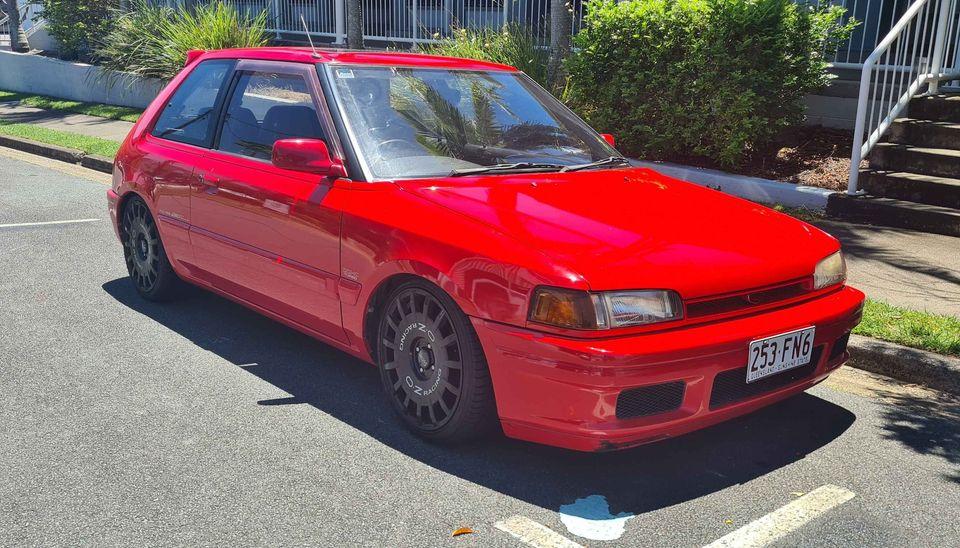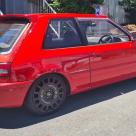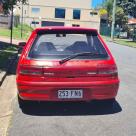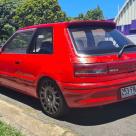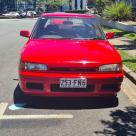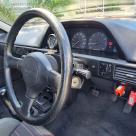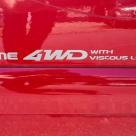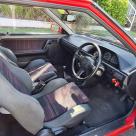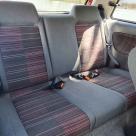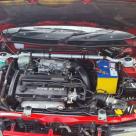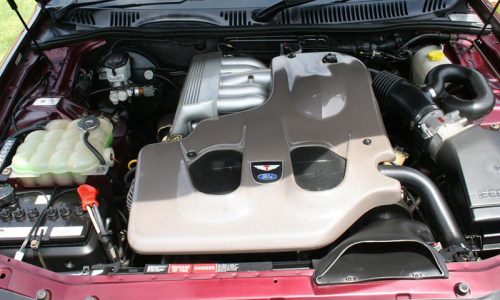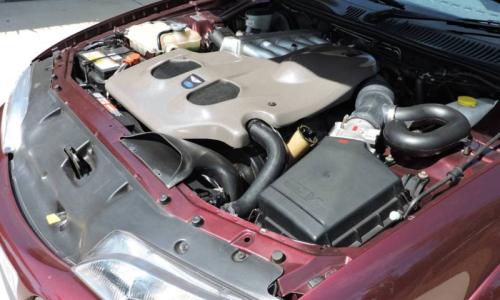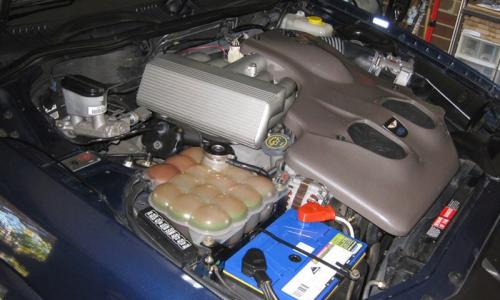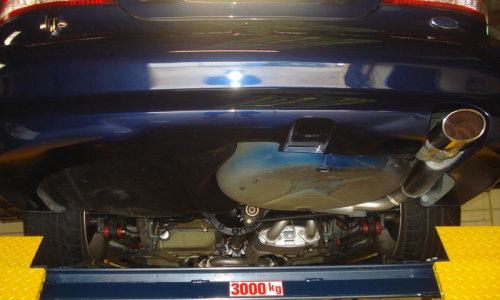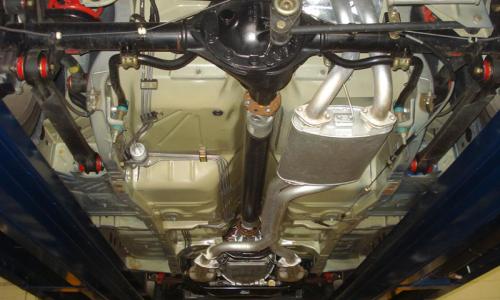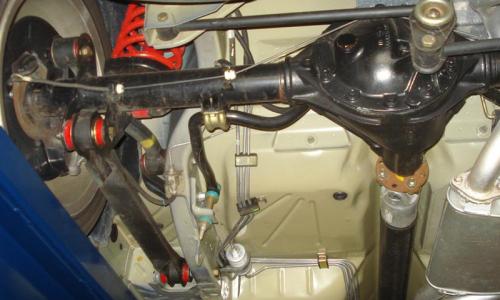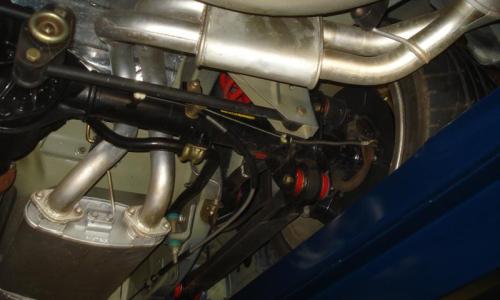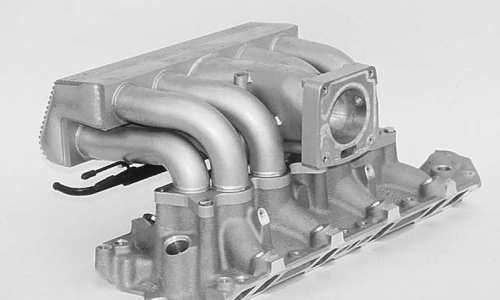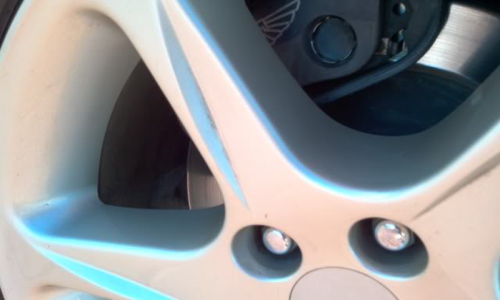For sale: 1991 GT-R Gen 3 Celica Toyota
Specifications
Mechanical features – Ford Falcon EL GT [28] [29] [30] [31] [32] [33] [34]
Like its predecessor the EB GT, the V8 engine applied to the EL GT was similar in specification to Fords SVO Mustang Cobra, with adaptations by TVE for local conditions and Australian compliance. Revised specifications were given to SVO to build the engines in the Cleveland plant in Ohio, before shipping them to Broadmeadows. This engine produced more power than Ford’s standard 5.0l V8, however, did not represent any major departure from the EB GT’s engine specification, other than an increased torque range. The performance of this engine was achieved mainly through camshaft, intake and cylinder head improvements as designed by Ford USA’s Special Vehicle Operations / Power Products division. The majority of the remaining drive train consisted of components shared with the XR models, however, other enhancements were made with respect to the transmission and handling, as outlined below.
Performance figures:
- 0 – 100kph: 6.97s (claimed), 7.03s (as tested by Motor Magazine, March 1997), 8.08s (as tested by Wheels Magazine, April 1997)
- 400m / ¼ mile: 15.06s (claimed), 15.00 seconds (as tested by Motor Magazine, March 1997), 15.76 (as tested by Wheels Magazine, April 1997).
- 1600kg towing capacity.
- Power (DIN): 200kW (270bhp) @ 4,700 rpm.
- Torque (DIN): 420Nm (310lb-ft) @ 3,700 rpm.
Engine:[26]
- 5.0l / 4942cc (302ci) fuel injected OHV 16-valve V8.
- Bore & stroke: 102 x 76mm (4.00 x 3.00in).
- Compression ratio: 9.0:1.
Head design:
- Cast iron crossflow Ford SVO GT40 heads were fitted with crane roller rockers, providing a flow of 196/129cfm. This flow was achieved through larger inlet and exhaust valves. This is a significant increase on the flow achieved by the standard E7 V8 heads used on the EL XR8 and other EL V8 models. Inlet and exhaust valves also contained an inner damper spring. Greater valve lift is achieved by using 1.7:1 roller rockers compared with the stock 1.60:1 rockers, and the combustion chamber gave a more efficient burn than the standard E7 heads.
Fuel ignition and engine management system:
- A multi-point electronic fuel injection system was applied with high flow injectors (identified by their blue body) and electronically controlled ignition, which used Ford’s EEC5 engine management system, uniquely altered for the GT. The part number of the engine management system was 96DT 12A650 HB for manual vehicles and 96DT 12A650 JB for automatic vehicles.
- A free-flow alloy inlet manifold was fitted, and throttle body diameter increased by 14% to 65mm (up from 61mm). Mass flow sensor diameter increased by 34% to 74mm (previously 55mm). A Tickford intake snorkel was applied, as well as the addition of a venturi to the air cleaner assembly.
Exhaust:
- Low back pressure (50% reduction compared to standard EL V8) dual exhaust system: 2.5 inch twin pipe free flow, with a 4 to 1 extractor system (42mm stainless steel tube). The extractors were coated with special ceramic material to give a dull chrome finish and to reduce heat in the engine bay, removing need for heat shields. This system was based on the EL XR8 with flow enhancements. The exhaust system passed through twin catalytic converters and mufflers.
Transmission:
Manual gearbox specifications
- Reverse gear idler has been upgraded in strength.
- Gear lever fulcrum lifted for shorter shifts.
- Softer detent spring used (7lb vs. 10lb) for faster shifting.
- Clutch same as ED “Sprint”
- T5 5-speed manual: The manual transmission had a heavy duty SVO clutch applied (268mm Veleo plate with 40% more torque capacity than standard).
Gear ratios:
- 1st: 2.95:1
- 2nd: 1.94:1
- 3rd: 1.34:1
- 4th: 1.00:1
- 5th: 0.73:1
- Reverse: 2.76:1
- LSD axle ratio: 3.27:1
Automatic gearbox specifications:
- BTR95LE 4-speed automatic or BTRT5 5-speed manual Borg-Warner transmission was available, and all cars were fitted with a limited slip differential.
- Type BTR 95LE 4-speed + overdrive automatic transmission, with lock up torque converter and electronically recalibrated shift points through the use of a separate EEC-IV management system. These transmissions had US-made gear sets installed in the Australian-made BTR housing. Ratios, however, were the same as the standard Falcon unit as follows:
- Tickford persuaded BTR to develop a form of adaptive shift for the Aussie designed and developed 4-speed. The automatic transmission in the GT was fitted with the following revisions:
- Planetary gear set.
- Pinion shafts supporting pinion gears have been cross drilled to improve
lubrication and heat removal at high speeds. - Centre support shaft has been cross drilled and a fluid passage through
the centre aids heat removal and lubrication at high speeds. - Transmission Control Module is unique to the GT
- Different shift maps that change automatically as dictated by the driving
style of the driver at the time.
Gear ratios:
- 1st: 2.39:1
- 2nd: 1.45:1
- 3rd: 1.00:1
- 4th: 0.68:1
- Reverse: 2.09:1
- Rear LSD axle ratio: 3.45:1
Handling
Steering:
- Power assisted variable ratio rack and pinion steering.
- The steering rack applied to the GT was a Reman brand, the same as applied to the ED Falcon Sprint, having approximately 2.9 turns lock to lock (versus 3 turns for the standard Falcon). This reduces travel and allows clearance for the larger tyres, and gives the GT a turning circle of 11.5m. There should be a letter “G” stamped into the rack housing according to forum discussion. If anyone has an image of this tag or stamping, please contact us so we can add the example to this section of the guide.
Brakes:
- 4-wheel anti-lock disc brakes with enlarged standard compound brake pads were fitted.
- Front discs had ventilated 329mm rotors (standard EL rotors were 287mm). The rotors were 28mm thick, (standard EL rotors were 25mm). The front brakes had twin-piston PBR Tickford branded callipers, as used on the Mustang Cobra, and provided a 12% increase in the pad-swept area compared to the standard EL brakes. The size of the front brake callipers meant the front spindles and brake hoses were unique to the GT to allow clearance.
- Rear brakes had solid 299mm rotors with standard non-Tickford callipers.
Suspension:
- Front and rear stabilizer bars (sway bars) with urethane bushes. Front anti-roll bar was 28mm (up from 27mm on the XR8). Rear anti-roll bar was 24mm.
- Tie bar, lower arm pivot, upper suspension bar and anti-roll bar urethane bushes have been upgraded due to the wider tyres.
- Live rear axle with 4 trailing arms and Watts linkage.
- Munroe Australia 6-valve dampers, with single rate coil springs. These springs are colour coded red and are unique to the GT.
- Twin-tube telescopic shock absorbers. The shock absorbers were also colour coded red.
Wheels and tyres:
- Unique 17 x 8.5 inch 6-spoke ROH alloy wheels were fitted to the GT (including a full-size spare), finished in a pale silver-gold colour. We have not yet been able to confirm the precise paint code, so please contact us if you have further information and we will update this section. Wheels were originally fitted with Yokohama A510 245/40 VR17 tyres and had locking wheel nuts with a special coded adaptor socket.[13]
Aerodynamics:
- Overall, a 40% reduction in lift was achieved from the body kit design, with a drag coefficient of 0.31.
Driveline:
- A Hydratrak limited slip differential was developed for the GT by BTR, and features a unique fluid coupling unit. This system smoothly increases torque transfer to the slower rotating wheel
- Axles are semi floating and are unique to the GT, due to the Hydratrak differential.
- The drive shafts fitted to the manual transmission have an 840Hz slip yoke damper and no internal damper. The drive shafts fitted to the auto transmission have neither a slip yoke nor internal damper.
- Tickford also worked with Dana to develop a lightweight aluminium driveshaft wrapped in a 3mm thick carbon-fibre sheath. This makes the shafts stiffer yet lighter, and the new driveshaft was intended to eliminate the chronic driveshaft flex problem which can limit high speeds.
Vehicle location
Australia , Gold Coast , Palm Beach
A lesser known Group A rally legend - this example was advertised on Facebook Marketplace asking $13,500 in late 2022. These were the equivalent of the Baby Godzillas (Nissan GTiR), and were a very well balanced 4WD rally legend, which did relatively well in private competitions particularly in the UK. This series of Mazda were a fairly quality car I find, and perhaps a little higher quality than the GTiR Nissan - albiet these are a little less powerful than the SR20. They shared the same platform with the Laser TX-4 4X4 of course (but the Ford was never officially a Group A rally car, as they had their own version in the form of the Escort in Europe).
Great to see these imports still coming up at under $15K still, Needs a bit of work I'm sure, but a great fun rally car. See the original listing here.
